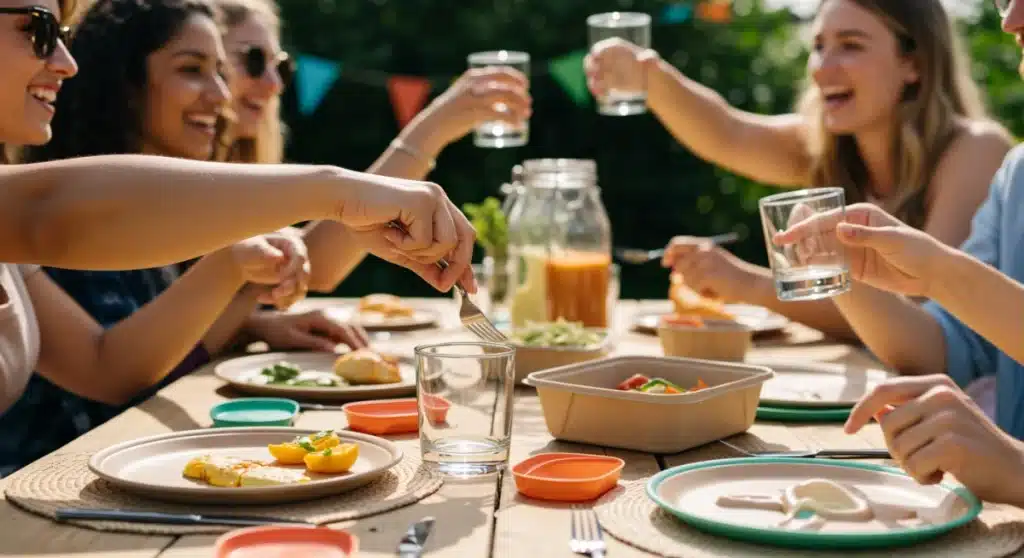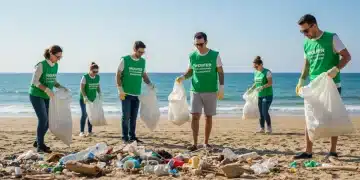Plastic-Free Party 2025: Reduce Event Waste by 70%

The movement towards sustainable events is gaining significant momentum, with new initiatives focusing on drastically cutting down environmental impact. As of recent reports, a critical focus for 2025 is on Practical Solutions: How to Host a Plastic-Free Party in 2025 – Reducing Event Waste by 70%, offering a clear roadmap for individuals and organizations alike.
The Urgency of Plastic-Free Events
The global plastic crisis continues to escalate, making the adoption of plastic-free practices not just an option but a necessity. Event waste, often characterized by single-use plastics, significantly contributes to landfills and ocean pollution. The push for a 70% reduction by 2025 reflects a growing recognition of this urgent environmental challenge.
Recent developments indicate increased consumer demand for eco-friendly alternatives and stronger regulatory pressures. Event planners and hosts are now actively seeking viable solutions to minimize their ecological footprint, driving innovation in sustainable event management.
Understanding the Scope of Event Waste
- Single-Use Plastics: Utensils, plates, cups, straws, and packaging form the bulk of plastic waste at events.
- Food Waste: Often intertwined with plastic packaging, uneaten food also contributes significantly to landfill volume.
- Decorations: Balloons, plastic streamers, and synthetic fabrics are common culprits that end up as non-biodegradable waste.
Strategic Planning for Zero-Waste Success
Achieving a 70% reduction in event waste by 2025 requires meticulous planning and a shift in mindset. Hosts must integrate sustainability into every aspect of their party preparations, from guest invitations to post-event cleanup. This involves careful vendor selection, thoughtful material choices, and clear communication with attendees.
According to environmental consultants, early adoption of sustainable practices yields better results as it allows for testing and refinement. This proactive approach ensures that by 2025, plastic-free parties become the norm rather than the exception.
Key Steps in Sustainable Event Planning
Effective planning is the cornerstone of any successful plastic-free event. It involves anticipating waste streams and proactively implementing strategies to prevent them. This includes everything from digital invitations to comprehensive recycling and composting stations.
- Digital Invitations: Eliminate paper waste and plastic packaging associated with traditional invites.
- Reusable Decor: Opt for natural, biodegradable, or reusable decorations instead of single-use plastic items.
- Waste Sorting Stations: Clearly labeled bins for compost, recycling, and landfill waste encourage proper disposal.
Innovative Alternatives to Single-Use Plastics
The market for sustainable alternatives is rapidly expanding, offering numerous options for hosts aiming for a plastic-free event. From compostable serveware to reusable drink containers, these innovations make it easier than ever to avoid single-use plastics without compromising convenience or aesthetics.
As reported by industry experts, advancements in biodegradable materials and closed-loop systems are pivotal. These solutions not only reduce waste but also contribute to a circular economy, where resources are kept in use for as long as possible.
Sustainable Serveware and Cutlery
Replacing plastic plates, cups, and cutlery is one of the most impactful steps in hosting a plastic-free party. Numerous eco-friendly options are now widely available.
- Bamboo or Palm Leaf Plates: Biodegradable and compostable, offering a natural aesthetic.
- Metal Cutlery: Reusable and durable, ideal for rental or personal collections.
- Glassware and Reusable Cups: Reduces plastic bottle and cup waste; consider offering guests branded reusable cups as favors.
The availability of these alternatives has made the transition to plastic-free events significantly smoother, allowing hosts to maintain high standards of service while upholding environmental responsibility.
Food and Beverage Management Without Plastic
Managing food and beverages at a party without relying on plastic packaging and containers presents a unique challenge, but one that is increasingly solvable with careful consideration. This involves sourcing local, unpackaged ingredients and implementing efficient serving methods.
Developing news indicates that caterers and food suppliers are adapting to this demand, offering bulk options and returnable container programs. This collaboration between hosts and suppliers is crucial for achieving the 70% waste reduction target by 2025.

Smart Sourcing and Serving Strategies
To minimize plastic from food and beverages, consider these practical approaches:
- Bulk Purchases: Buy ingredients in bulk to reduce individual packaging waste.
- Local and Seasonal Produce: Supports local economies and often comes with less packaging.
- Water Stations: Provide water in large dispensers with reusable cups instead of single-serve plastic bottles.
- Reusable Food Containers: Work with caterers who use returnable containers for delivery and storage.
These strategies not only reduce plastic waste but also promote healthier, more sustainable food choices, enhancing the overall quality of the event.
Engaging Guests in the Zero-Waste Mission
Guest participation is crucial for the success of any plastic-free party. Educating attendees about the event’s sustainability goals and providing clear instructions for waste disposal can significantly enhance waste reduction efforts. This engagement fosters a collective responsibility towards environmental stewardship.
As reported, events that actively involve guests in their sustainability initiatives often see higher compliance rates and a greater overall impact. This can be achieved through subtle prompts and clear signage.
Tips for Guest Engagement
To ensure guests contribute positively to your plastic-free goals, consider these methods:
- Communicate Early: Mention the plastic-free nature of the event in invitations.
- Clear Signage: Label waste stations clearly with instructions for composting, recycling, and landfill.
- Lead by Example: Hosts and staff should visibly follow plastic-free practices.
- Educate Playfully: Share fun facts about sustainability or the impact of plastic waste to encourage participation.
By making sustainability a shared goal, hosts can transform a party into an educational and inspiring experience for everyone involved.
Measuring Impact and Continuous Improvement
To effectively reduce event waste by 70% by 2025, it is essential to measure the impact of plastic-free initiatives and continuously seek areas for improvement. This involves tracking waste metrics, gathering feedback, and adapting strategies for future events.
Developing analysis suggests that data-driven approaches lead to more significant and sustained waste reductions. Regular assessment allows hosts to identify what works well and where further adjustments are needed.
Analyzing Waste and Refining Practices
Effective measurement and improvement strategies include:
- Waste Audits: Post-event assessment of waste streams to quantify plastic reduction.
- Guest Feedback: Surveys or informal discussions to understand guest perceptions and suggestions.
- Vendor Reviews: Evaluate supplier performance in adhering to plastic-free requirements.
- Benchmark Against Goals: Regularly compare actual waste reduction against the 70% target to make necessary adjustments.
This iterative process ensures that each subsequent event builds upon the successes of the last, moving closer to the ambitious goal of significantly reducing event waste.
| Key Point | Brief Description |
|---|---|
| Strategic Planning | Integrate sustainability from invitations to cleanup for maximum waste reduction. |
| Innovative Alternatives | Utilize compostable serveware, metal cutlery, and reusable drink containers. |
| Guest Engagement | Educate guests on waste sorting and the event’s plastic-free goals. |
| Measuring Impact | Conduct waste audits and gather feedback for continuous improvement. |
Frequently Asked Questions About Plastic-Free Parties
Start by eliminating single-use plastic plates, cups, and cutlery. Opt for reusable items or compostable alternatives like bamboo or palm leaf products. Also, prioritize digital invitations over paper ones to reduce initial waste.
Provide clearly labeled waste stations for recycling, composting, and landfill. Use visual aids and perhaps a brief explanation during the event. Consider having a designated ‘waste ambassador’ to guide guests if feasible.
Compostable products are eco-friendly if properly disposed of in commercial composting facilities, as they require specific conditions to break down. Check local municipal services for compost collection or specialized composting centers in your area.
Consider decorations made from natural materials like fresh flowers, leaves, or edible arrangements. Reusable banners made from cloth, fairy lights, or even rented decor items are also excellent plastic-free choices for any celebration.
Work with caterers who offer bulk food options and use reusable containers for delivery and serving. Request no single-use plastic packaging for food items. Encourage guests to bring their own containers for leftovers, if appropriate.
Looking Ahead: The Future of Sustainable Celebrations
The drive towards Practical Solutions: How to Host a Plastic-Free Party in 2025 – Reducing Event Waste by 70% signifies a pivotal shift in how society approaches celebrations. This aggressive target reflects a collective commitment to environmental responsibility, impacting not just individual events but also influencing broader industry standards. As technology and consumer awareness evolve, we anticipate even more innovative solutions and widespread adoption of sustainable practices. This movement is not merely about eliminating plastic; it’s about fostering a culture of mindful consumption and resourcefulness for a healthier planet.





